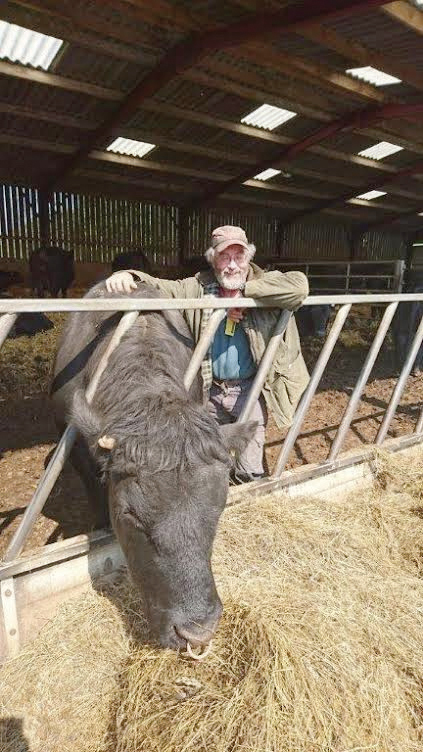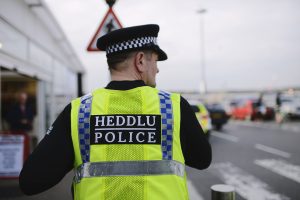
NESTLED in the Cambrian Mountains of Mid-Wales, just a short drive outside of Aberystwyth, lies Moelgolomen farm.
The organic 750 acre holding is home to Rhodri Lloyd-Williams, his wife Sarah and their three children – sixyear old Elen, three-year old Ariana, one-year old Cai, as well as 750 Welsh Mountain ewes and 25 Welsh Black suckler cows.
Helping with the running of the holding are Rhodri’s parents, Simon and Monica, who took the farm over in 1975, which has been in the family for over 400 years.
Rhodri and Sarah set up a boxscheme in December last year in a bid to diversify and to offer the community the chance to reduce food miles and purchase their food direct from the farm.
Lambs for the box scheme are butchered just down the road in Machynlleth before being boxed and delivered fresh direct to their customers.
“We’ve always done home kills of our lambs for ourselves (why would we settle for anything less?!) and over the years we started doing a few more for family, and then for friends and then for friends of friends until before long we had orders coming in from everywhere, which is why we decided to set up welshmountainlamb.com to make it easier for people to order and for customers to see where their lamb is coming from,” said Rhodri.
The family also sell their lambs via Dunbia, Llanybydder, where between 5 and 10 percent of it is sold as organic produce throughout UK supermarkets. The rest, accounting for over 80 percent, is exported to Europe.
Rhodri explains that: “for organic lamb to be sold here in the UK the supermarkets want it to weigh in at over 15kg. Because our Welsh Mountain lambs don’t always come in at that weight most of it gets exported to parts of Europe where consumers prefer smaller lambs.”
The Welsh Black cattle are sold as stores at 18 months of age to an organic buyer.
“We pride ourselves on our ethical and sustainable approach to agriculture and have farmed organically since 1999. We have always looked to farm in a sustainable way creating not only an environment where livestock can thrive but also one that is sympathetic to the environment,” Rhodri said.
Moelgolomen farm has been involved in a number of environmental schemes and is currently in the Glastir Scheme.
In the last few years the family have planted up over 30 acres of woodland as well as an orchard and a few miles of hedgerows to create a variety of habitats for wildlife to thrive.
“We’ve planted tens of thousands of trees in the last 20 or so years. Some in our area of ancient Oak woodland, which we stock excluded in the year 2000 and added to the original Oaks upwards of 20,000 trees including Welsh Oak, Scots Pine, Hazel, Willow, Sweet Chestnut, Holly, Cherry and a number of other native tree species.
“Since we’ve fenced the area off we’ve seen other trees self-seed such as Ash, Rowan, Beech and Birch, to leave a rich and varied woodland teeming with life,” explains Rhodri.
In addition to the woodland Rhodri and his family have also planted a few miles of hedgerows around fields, having double fenced areas to keep the livestock out.
“We now have these wildlife corridors linking large areas of the farm allowing wild animals to travel long distances without having to venture from the sanctuary of the hedge lines,” he added.
The family have also installed a hydro-scheme and solar PV so that most of their electrical needs are generated on farm and the rest is imported from a green energy company so the entire farm is powered by renewable sources.
Speaking about their commitment to renewable energy, Rhodri says: “In 2012 our hydro scheme came online which meant for large periods of the winter (and more often than not most of the summer too) the farmhouse and all the sheds were powered by electricity generated on farm.
“As we feel so strongly about renewable technology we have subsequently switched our energy suppliers to a renewable energy company so that even when we are enjoying a dry spell our carbon footprint is minimal.”
The farmhouse lies at 600 feet above sea level with the tops of the hills stretching up to 1500 feet on the fell, allowing the stock to have a large area to roam and a great variety in grasses, clovers and herbs which helps create the distinctive taste of the Welsh Mountain lamb, and because they are left to develop naturally on the hills, the animals mature slowly to create that rich flavour and lean meat associated with their lambs.
“All our sheep lamb outside in March and April, and once they’ve left the lambing fields, after a few days they’re free to roam the hills and enjoy the views.”
And while all seems perfectly idyllic, there is something that worries the family – the upcoming EU referendum.
“I feel responsible for Moelgolomen farm – it has been in our family for over 400 years. And whilst we look at all options to be sustainable and profitable, we are just like many other family farms in Wales, reliant on not just the Single Farm Payment but also access to the European market,” said Rhodri.
The family father of three is under no illusion that things would be very different for his business if the UK chose to leave the European Union in June.
“I would almost certainly be worse off. In all honesty, leaving the EU is not going to be a smart move for agriculture and for the economy as a whole.
“Over 80 percent of my produce gets exported to a market that has access to over 500 million customers – why would I want to put that at risk?
“Those who say we can set up our own trade agreements need to realise that it is not in the interest of the EU to see the UK succeed outside of the European Union and I think they would make it extremely difficult for us to trade with them.
“If it was easy for the UK to access that market after a Brexit – what is there to stop others from leaving as well?
“The thought of putting our family business at risk with the possibility of losing it is just not a chance I want to take.
“The EU is not perfect, that much we know and that’s why we are having this referendum in the first place. People are not happy with the status quo and politicians need to listen.
“But what good could come from walking away from the negotiating table? Let’s do the right thing and keep the conversations open. That way we have a chance of making a change that will affect us positively.”

















Add Comment